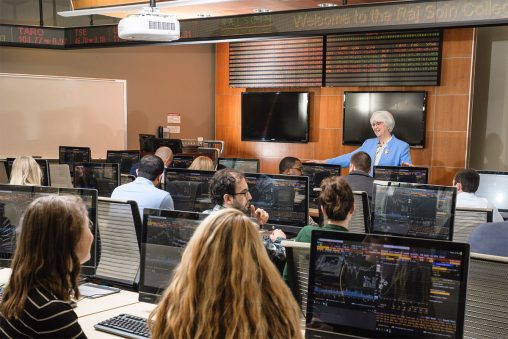
Finance students in the Real Money Investing course usually meet in the Soin Trading Center in Rike Hall.
The value of Wright State University’s student-managed investment portfolio has passed the $2 million mark, a milestone that underscores the long-term success of the program.
Finance students in the Raj Soin College of Business manage the portfolio of university funds in a course titled Real Money Investing. Typically, eight to 10 students take the course.
The portfolio was established in 1996 with $60,000 from the Wright State University Foundation and was infused with an additional $500,000 in 2006 from the Wright State Board of Trustees.
Since the end of 2015 and through June 5, the fund has earned 12.13% annualized. That compares to 10% by the S&P 500.
The Wright State portfolio’s value passed $2 million on June 5.
Matthew Ingram, senior lecturer of finance and financial services, said managing the portfolio gives the students skills in risk management and company valuation.
It also helps them learn to keep their emotions in check during market volatility and realize that investing is part psychology, part finance. Ingram said the students take into the workplace an ability to make informed decisions based on research and data, not emotions.
He said the most challenging thing for students is picking stocks for the portfolio.
“It’s often the first time they have used real money in investing,” he said. “The most gratifying thing for them is waiting patiently for good opportunities and then buying stocks below intrinsic value and watching them go up.”
The class usually meets in Rike Hall’s Soin Trading Center, which has a computer lab with a stock ticker tape that runs across the ceiling. When in-person classes transitioned to remote teaching in March due to the COVID-19 pandemic, the students managing the portfolio met remotely twice a week.
“As the stock market went down, our students bought many stocks at reduced prices,” said Ingram.
During the summer, an ad hoc committee of former students manages the fund.
Marlena Akhbari, associate professor and chair of the Department of Finance and Financial Services, said the course is a great experiential learning opportunity for finance and financial services students.
“They learn firsthand not only how to complete detailed research and pick stocks, but also to present their findings and argue their positions so the class can come to a consensus; excellent skills for life,” Akhbari said.

 Glowing grad
Glowing grad  Wright State’s Homecoming Week features block party-inspired events Feb. 4–7 on the Dayton Campus
Wright State’s Homecoming Week features block party-inspired events Feb. 4–7 on the Dayton Campus  Wright State music professor honored with Ohio’s top music education service award
Wright State music professor honored with Ohio’s top music education service award  Wright State’s Industrial and Human Factors Engineering program named one of top online graduate programs by U.S. News
Wright State’s Industrial and Human Factors Engineering program named one of top online graduate programs by U.S. News  Student-run ReyRey Café celebrates decade of entrepreneurship at Wright State
Student-run ReyRey Café celebrates decade of entrepreneurship at Wright State 